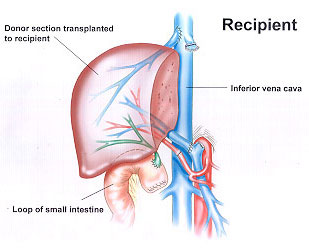Live-donor liver transplantation
In live-donor liver transplantation (LDLT) a healthy person donates a portion of his or her liver to another individual, usually a relative or friend. After the portion is removed, the donor's liver re-grows to near its full size within four weeks after the procedure. The donated liver also grows to support the liver recipient's body.
Patients may be considered for LDLT if:
- Have progressive liver failure
- The patient is a candidate for liver transplant
Donation

Most donors are family members of the liver transplant recipient, but other close relationships will be considered. The potential donor is screened through:
- Health and wellness questionnaire
- Blood tests
- Interviews and exams with the transplant team members
- Radiologic evaluation of potential donors anatomy
These tests assess compatibility between the donor and the recipient. The donor and the recipient must have compatible, but not necessarily matching, blood types. For instance, a donor with blood type O can donate to a recipient with any blood type.
Procedure

During the donor operation for an adult recipient, the right lobe of the liver is removed. The operation preserves the blood supply from the hepatic artery and portal vein, the bile duct and the right hepatic vein. For infant and pediatric LDLT recipients, smaller pieces of the liver can be used. The recipient's diseased liver is completely removed and the donor's right lobe is put in its place. Blood vessels and bile ducts are then connected to their appropriate counterparts.
Recovery
There are risks associated with surgery of this magnitude. The transplant team will discuss these risks in depth. The donor is hospitalized for about seven to 10 days if there are no complications. The donor will need to recuperate at home for two to three more weeks. Donors may return to work and other activities as early as the first post-operative month.
The recipient's recovery time is dependent on his or her degree of disability before the transplantation.
The UF Health difference
Surgeons at the UF Health Transplant Center performed north Florida's first LDLT in 2000.
Information
If you are interested in more information on the treatment programs and options offered by physicians practicing at UF Health, you are invited to fill out and submit the following form. It will be routed to the appropriate practitioner for reply. Please rest assured that your information will be treated confidentially. Thank you for your interest in UF Health You can also call (866) 548-3783 toll-free to make a referral the to liver transplant program at the UF Health Transplant Center.
Our experts
Community and Patient Programs: Live-donor liver transplantation
Our community and patient programs provide great value to patients, families and loved ones. People can find support, educational materials, expert consultants and more. In most instances, these programs are offered free of charge.
-
Liver Support Group
This support group provides education and psychosocial support for patients who have liver disease or are awaiting liver transplants and who have been transplanted. Call (352) 265-0754 for the next scheduled meeting of the support group.
-
Music in the Clinical Setting
Offers a wide variety of music-based therapies from in-room performances to collaborative recording sessions.
